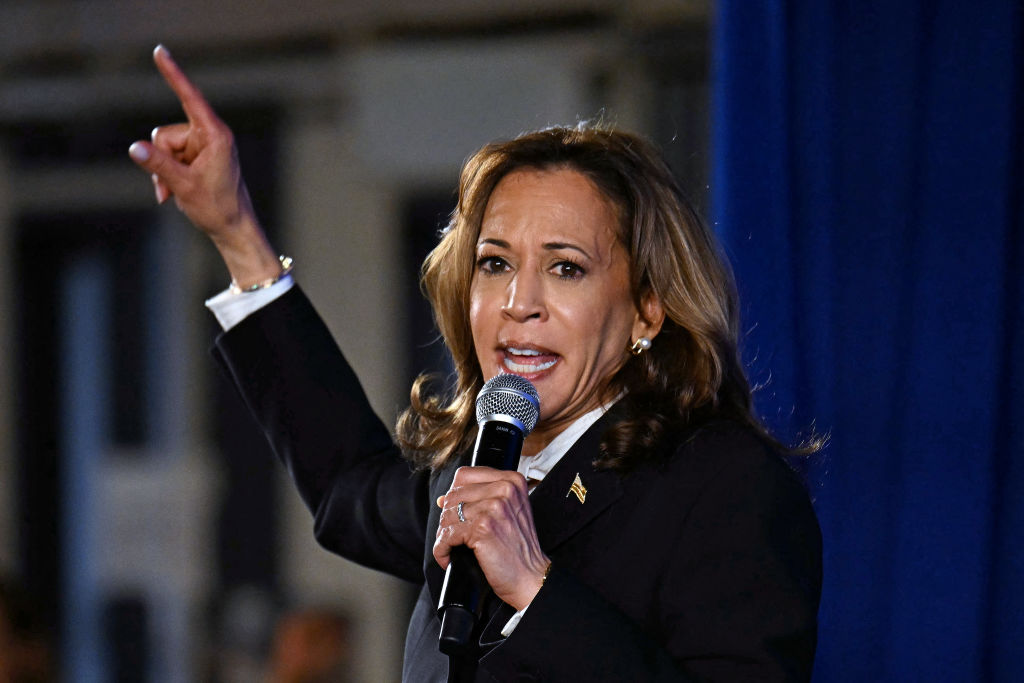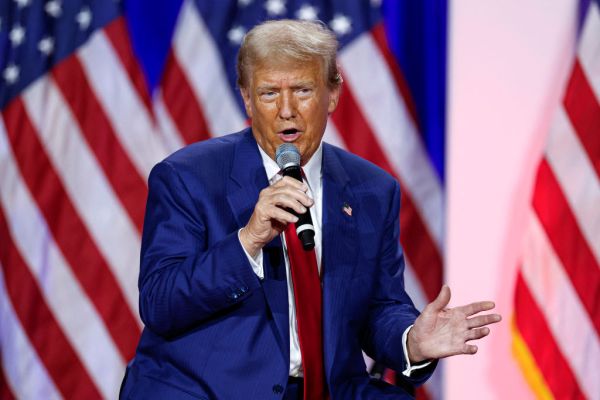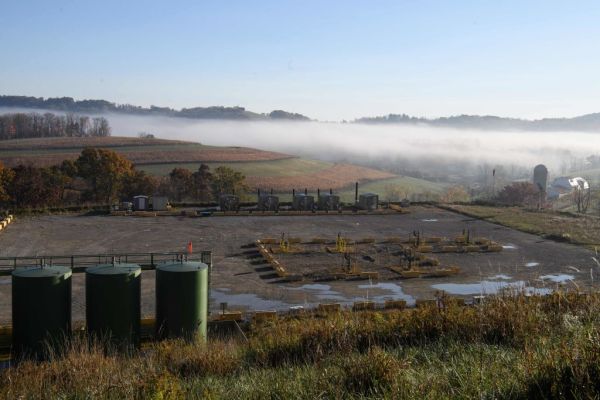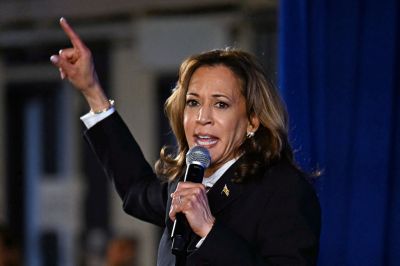Happy Friday! Election Day is 53 days away. Today also marks two months since the assassination attempt on Donald Trump in Butler, Pennsylvania.
Up to Speed
- Former President Donald Trump said Tuesday’s debate in Philadelphia will be the final one between him and Vice President Kamala Harris before the election. In a post on Truth Social, Trump claimed contradictorily that Harris both wants a rematch because she did poorly and that she has refused to agree to debates on Fox News, NBC, and CBS. Trump ended his post in capital letters: “KAMALA SHOULD FOCUS ON WHAT SHE SHOULD HAVE DONE DURING THE LAST ALMOST FOUR YEAR PERIOD. THERE WILL BE NO THIRD DEBATE!”
- Harris, meanwhile, said on Thursday at her rally in Charlotte, North Carolina, that she believes “we owe it to the voters to have another debate.” Contrary to Trump’s claim, several polls showed voters felt Harris, not Trump, won the debate—though whether undecided voters will make their choice from that is, well, debatable.
- But for Harris, there may be more reasons than just her solid performance for wanting to face Trump on stage again: The New York Times reported Harris’ campaign “raised $47 million in the first 24 hours” after the ABC News debate. The Trump campaign did not respond to a question from Dispatch Politics about how much it raised during the same period.
- The Cook Political Report on Thursday changed its rating for Montana’s Senate race from “toss-up” to “lean” Republican, while Inside Elections shifted its rating to “tilt” Republican, spelling a warning sign for Democrats’ majority in the upper house of Congress. August polls have generally shown GOP challenger Tim Sheehy leading incumbent Democrat Sen. Jon Tester. The GOP will need to pick up two seats in November to take control of the Senate if Sens. Ted Cruz of Texas and Rick Scott of Florida win their races, which is likely. Republicans are all but certain to pick up West Virginia’s open seat, leaving them needing to win one competitive seat to flip the chamber.
Why Kamala Harris Needed to Flip-Flop on Fracking

PHILADELPHIA—To understand why Kamala Harris is working so hard to convince Pennsylvanians her change of heart on fracking is more than an empty campaign promise, examine the statistics, beginning with 123,000 jobs, according to one energy industry study.
“Let’s talk about fracking, because we’re here in Pennsylvania. I made that very clear in 2020. I will not ban fracking. I have not banned fracking as vice president of the United States,” Harris said this week during a prime-time debate with Republican nominee Donald Trump. “My position is that we have got to invest in diverse sources of energy so we reduce our reliance on foreign oil.”
Harris was responding to ABC News moderator Linsey Davis, who asked the vice president to explain why she no longer opposes fracking, despite saying she did in 2019 during her campaign for the Democratic nomination. When Harris accepted Joe Biden’s invitation to serve as his 2020 running mate, she adopted his position on the issue and said in the vice presidential debate that year that Biden would “not ban fracking.”
Pennsylvania is perhaps the pivotal battleground that will decide who wins the White House in November, with polls consistently showing the race between Harris and Trump for the state’s crucial 19 Electoral College votes all tied up. Given the major impact of the energy industry generally, and fracking in particular, on Pennsylvania’s economy, it’s no wonder Harris is sticking with her support for extracting natural gas from shale or other forms of “tight rock,” rather than reverting to her previous opposition.
Consider the findings of a study commissioned by the Marcellus Shale Coalition, an energy industry trade association in Pittsburgh that promotes the benefits of fracking.
In addition to the more than 123,000 jobs hydraulic fracturing—known informally as fracking—supports in Pennsylvania, the association’s study, based on calendar year 2022, found that this form of fossil fuel exploration creates $41.4 billion in annual economic activity; contributes $24.4 billion to the commonwealth’s Gross Domestic Product; pays out $12 billion in wages; and generates $3.2 billion in state and local tax revenues. (The Marcellus Shale Coalition told Dispatch Politics these figures have not changed significantly over the past two years.)
“In order to have the possibility of moving any moderate Republicans and many independents to vote for her, [Harris] had to come to peace with the issue of fracking,” Jeff Brauer, a political science professor at Keystone College, near Scranton, Pennsylvania, told Dispatch Politics. “In Pennsylvania, where the race is going to be so very close in November, an issue like fracking could be the difference.”
Fracking is the process of pulling oil, natural gas, and other fossil fuels from shale and other types of rock. In Pennsylvania, fracking is mostly about natural gas exploration. As in other states where fracking is prevalent, it has sparked much criticism and opposition from progressives, including elected Democrats, activists, and voters worried about climate change. Political groups representing their interests claim the economic benefits of fracking are overblown and not worth the accompanying risks to the environment.
Still, the politics of fracking in Pennsylvania decidedly favor its proponents, a dynamic appreciated by Gov. Josh Shapiro, the commonwealth’s Democratic chief executive and an outspoken advocate for Pennsylvania’s fracking industry. It explains why Trump, a strong and dependable supporter of all forms of fossil fuel exploration as president, is working just as hard as Harris—to cast doubt on the reliability of her newfound enthusiastic support for fracking.
“She will never allow fracking in Pennsylvania. If she won the election, fracking in Pennsylvania will end on day one,” Trump said during the debate, rebutting Harris. “If she won the election, the day after that election, they'll go back to destroying our country and oil will be dead, fossil fuel will be dead. We'll go back to windmills and we'll go back to solar, where they need a whole desert to get some energy to come out.”
In the spin room after the debate, Trump campaign spokesman Brian Hughes attempted a more nuanced approach. He claimed Harris’ support for fracking is a matter of political convenience, rather than a true appreciation for its importance to Pennsylvania’s economy, therefore making her position unreliable.
“On fracking, she said: ‘Oh, I’ve been clear since 2020.’ In 2020 she never accepted the premise of being for fracking. She said, ‘Well, now I’m with Biden and Biden’s for fracking,’” Hughes said. “She never got to a real answer to that question.”
Indeed, Brauer told us that “while the debate was an attempt in this direction, [Harris] still has more work to do to convince voters that her stance will be reliable and more than just political expediency.” But the vice president did get at least one overwhelmingly positive review Tuesday evening for her fracking comments, and from an important source.
“What I heard was the answer of an all-of-the-above would-be president of the United States,” Shapiro, who supports fossil fuel exploration and green energy development, told Dispatch Politics while stumping for Harris in the spin room post-debate. “She understands how important it is to Pennsylvania; I’m confident it’ll continue on her watch.”
‘Get It Done’ or Win? GOP Senators Parse Trump’s Ukraine Comments

Senate Republicans are trying to make sense of former President Donald Trump’s refusal to say whether he wanted Ukraine to win its war against Russia during his debate with Vice President Kamala Harris.
In Philadelphia on Tuesday, moderator David Muir of ABC News asked Trump whether he wanted Ukraine to win the war and whether its victory was in America’s best interests. “I think it’s the U.S.’s best interest to get this war finished and just get it done,” Trump said. “Negotiate a deal because we have to stop all these human lives from being destroyed.”
Republican senators who spoke to Dispatch Politics Thursday offered different explanations for Trump’s response.
“The reason he said that is because he wants to be in a position after he gets elected to have all leeway,” Iowa Sen. Chuck Grassley told Dispatch Politics on Capitol Hill, declining to elaborate when asked if he’d advise Trump to give a different answer in the future.
Grassley, like most Republicans in the Senate, voted in favor of the Senate bill providing aid to Ukraine, Israel, and Taiwan in April. Trump has offered differing positions on assisting the Eastern European nation since then. While Congress was trying to pass it, he called on Europe to spend more to defend Ukraine but acknowledged the country’s survival was “important to us.” After Speaker Mike Johnson risked his leadership position to get the aid through the House of Representatives, Trump defended him. But in June, the former president criticized the amount of aid America was giving to Ukraine, calling President Volodymyr Zelensky “the greatest salesman of any politician that’s ever lived” and promising to have the war “settled” before taking office.
South Carolina Sen. Lindsey Graham, a close Trump ally who is also a strong supporter of Ukraine’s war effort, attempted to explain the Republican nominee’s statement at the debate.
“The point for me is he wants to end the war. I think he understands how we end it matters. And what is winning?” Graham told Dispatch Politics. Graham said his standard of winning the war would be “not to humiliate Putin” but to see Ukraine free from further Russian aggression and “moving toward the West.” He added: “How you accomplish that is going to be through diplomacy, and I think what [Trump] wanted to do is just not lock himself into a particular definition.”
In terms of messaging on the issue of Ukraine, Graham added that he would advise Trump to say, “I want to end the war, and I want to end it in a way we don’t create new wars.”
Sen. Shelley Moore Capito of West Virginia, who serves as vice chair of the Senate GOP conference, said she hadn’t heard Trump’s answer to the question but offered strong support for a Ukrainian victory.
“I want Ukraine to win the war because I want to push back the Russians, and I just don’t think we can let people, particularly aggressor nations against us, attack and destroy countries because they want to reconstitute what they were 50 years ago. So, I would probably have a little bit of a different way of looking at that issue,” she said.
But one of Trump’s top Republican critics in the Senate, Utah’s Mitt Romney, was unsparing in his assessment of the former president’s Ukraine comments.
“That was really distressing. The leader of the free world surely has to stand with free nations who are trying to defend themselves from brutal invasion,” he said. “Of course Ukraine needs to win. Defining that is an art, of course, but the idea that Russia should be able to overwhelm its neighbor, a sovereign state that is free, is reprehensible, and President Trump missed the chance to stand with freedom.”
Eyes on the Trail
- Donald Trump is at Trump National Golf Course Los Angeles today for a press conference, following his Thursday rally in Tucson, Arizona.
- Kamala Harris is back in Pennsylvania today. The vice president flies in from North Carolina to Johnstown in the western part of the state for a campaign stop there.
- Gov. Tim Walz flies from Michigan to central Wisconsin, where the Democratic vice presidential nominee will speak with campaign volunteers in Wausau. On Saturday, Walz will fly into Duluth, in his home state of Minnesota, before holding a rally that evening just across the state line in Superior, Wisconsin.
- The tour continues as well for Doug Emhoff, the second gentlemen, who will be in Oxford, Mississippi, this afternoon, then The Villages in central Florida tonight.
Notable and Quotable
“Our four Electoral Votes are absolutely going to be in play, I don’t care what the national media say.”
—New Hampshire Gov. Chris Sununu at the state Republican Party’s Unity Breakfast, September 13, 2024








Please note that we at The Dispatch hold ourselves, our work, and our commenters to a higher standard than other places on the internet. We welcome comments that foster genuine debate or discussion—including comments critical of us or our work—but responses that include ad hominem attacks on fellow Dispatch members or are intended to stoke fear and anger may be moderated.
With your membership, you only have the ability to comment on The Morning Dispatch articles. Consider upgrading to join the conversation everywhere.